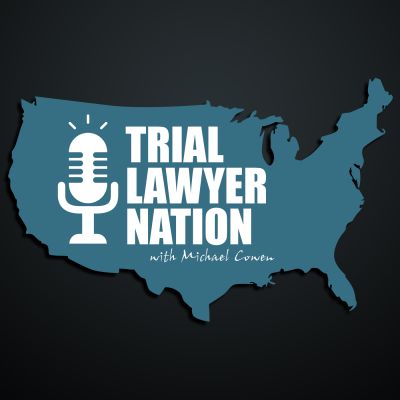Michael Cowen, and his guests, explore critical topics distinctive to the legal profession - specifically focusing on developing extremely efficient law practices, securing a competitive edge in the industry, and wildly excelling in the courtroom.
https://triallawyernation.com/
61 – Malorie Peacock – Elite Litigation: Strategies to Maximize the Value of Every Case
On this episode of Trial Lawyer Nation, Michael is joined by his law partner Malorie Peacock for a discussion of strategies they use to maximize the value of every case. They cover steps to take when you first get a case, storyboarding, gathering evidence, conducting a targeted discovery, the benefits of spending 3+ uninterrupted hours on a case, and so much more.
Michael and Malorie start off the episode with a conversation about what you should do when you first get a case to end up with the maximum value. They both agree you need to conduct a thorough investigation right away. Michael describes how he used to believe if he spent money on a case, he had to get a settlement out of it and get his money back. He would spend $20,000 to investigate and find out it was a tough liability theory but still file the lawsuit, do a ton of work, and spend even more money just to end up with a reduced settlement value and an unhappy client. He has since learned to write off these cases so he can spend his time and money on a case with potential for a better outcome. Malorie then explains how you can research the case yourself if you really don’t want to spend money early on, but Michael and Malorie both agree it’s best to hire an expert as soon as possible.
The discussion shifts to the topic of storyboarding early on in a case. Malorie explains how you plan out exactly how you want things to unfold, but you don’t need all the information right away to plan for a deposition. She describes her highly effective outlining strategy of placing information into “buckets” based on what she needs to talk to each of the witnesses about, constantly asking herself, “What do I really need? What makes this impactful for a jury or not?”
Michael then urges listeners not to appear nitpicky to the jury by bringing up non-causal violations. He shares an example of a different lawyer’s case with a truck driver who did not know any English. While truck drivers are required to speak enough English to understand road signs, the crash had nothing to do with this. That is, until they dug deeper and discovered a massive, shocking flaw in the trucking company’s training procedures.
While many of these strategies can be effective in making the case about the company and maximizing case value, Malorie emphasizes how you can’t ignore what happened in the crash. If it’s the worst company in the world but they had nothing to do with the crash, it doesn’t matter. Michael argues you should always try to make it a systems failure, but if you investigate and there is no credible story, you need to change course. They then discuss other places to look for systems failures which are often overlooked, including the company’s post-crash conduct. Finding these creative case stories and being willing to change course if you find a better story are key to maximizing case value.
Malorie brings up that there are lots of places to gather evidence, many of which are often overlooked. Michael urges listeners to go out to the crash site and walk around, look for cameras, and talk to people whenever possible. He also sees Freedom of Information Act requests as a valuable asset in any case involving an industry with regulations. You can see more than just past crashes, audits, and violations. He explains how sometimes you will see a trucking company who earned the highest score in a safety audit because they promised to fix the issues they had, which they never fixed. Malorie accurately replies, “That sounds like gross negligence.” They both discuss other types of companies who break promises often, and how showcasing this can be a valuable tool in showing the jury this company didn’t just make one mistake, they purposefully lied and tried to cover it up.
Michael and Malorie then discuss how they conduct a targeted and specific discovery. Michael shares how forms can be useful, but adds that you need to look at the issues in your case and adjust thos...
